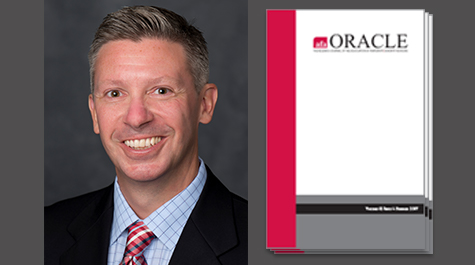Jim Barber named editor of fraternity/sorority research journal
Oracle publishes biannual issues containing peer-reviewed articles featuring empirical research on topics including hazing behaviors, alcohol and other substance abuse, measuring characteristics of brotherhood and sisterhood, and historical trends that continue to inform present-day work in the field of student affairs. “We saw a need in the field for a clearinghouse for research about the fraternity and sorority experience,” Barber said when asked where the inspiration to create Oracle came from.
Barber was a doctoral student in higher education at the University of Michigan when he worked with a team of colleagues from the Association of Fraternity/Sorority Advisors to launch the journal in 2005. He was pleasantly surprised to receive support from faculty and staff around the country to form the original peer review board for the publication. Barber has also published in the journal in the past; his favorite contribution is an article which examines administrative responses to hazing in the 1870s and drew upon historical documents available in the University of Michigan’s archives.
The journal is not run exclusively by Barber, however, and he is quick to credit the editorial team, which includes three assistant/associate editors, and over 30 members of the peer review board. Doctoral students in W&M’s higher education program have contributed as well; Amanda Armstrong (Ph.D. candidate) and Diana Hernández, Ph.D. ‘17 have both served as editorial assistants for Oracle. Armstrong shared, “Working with and getting to know the leadership team for Oracle has been a pleasure. Although I am not a member of a Greek-letter organization myself, I’ve gained invaluable knowledge towards the field and skills regarding peer-reviewed publications.” Barber said that the journal has become more widely recognized within fraternity and sorority affairs, but that he’d like to see its reach expand even further to both university leaders and scholars of higher education in general. “It’s a great opportunity to be at W&M and serve as editor,” he said, “because there’s so much history of fraternity and sorority life here starting with the founding of Phi Beta Kappa back in 1776.”
In addition to his editorial duties and graduate classes, Barber is also the instructor of a first-year seminar on fraternity and sorority life for undergraduate students (INTR/COLL 150). Fifteen students, both affiliated with fraternity and sorority life and not, learn about the history and growth of fraternity and sorority life in the U.S., its purposes, and relevance on campus today. He also has served as an advisor and faculty fellow for the Virginia Delta chapter of Sigma Phi Epsilon at W&M for the past eight years.
Visit Oracle’s website to read past issues of the publication and learn more about the Association of Fraternity/Sorority Advisors Foundation (AFA).
